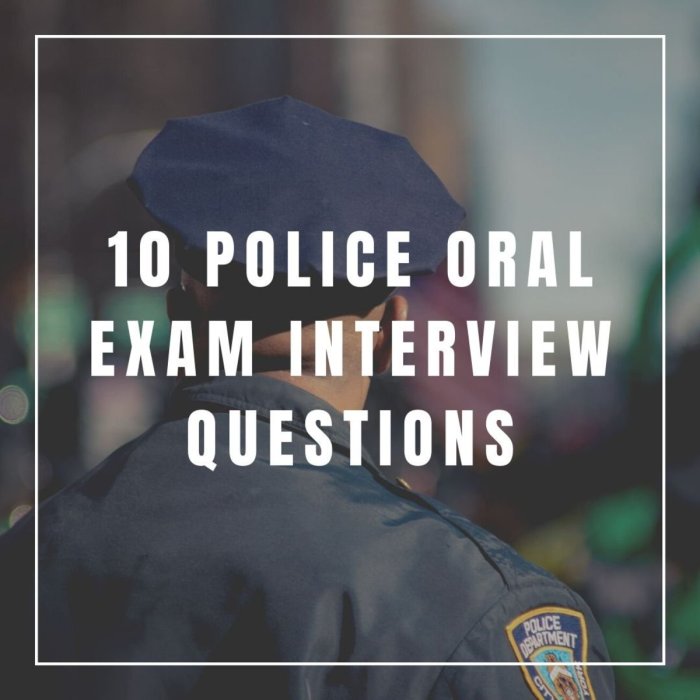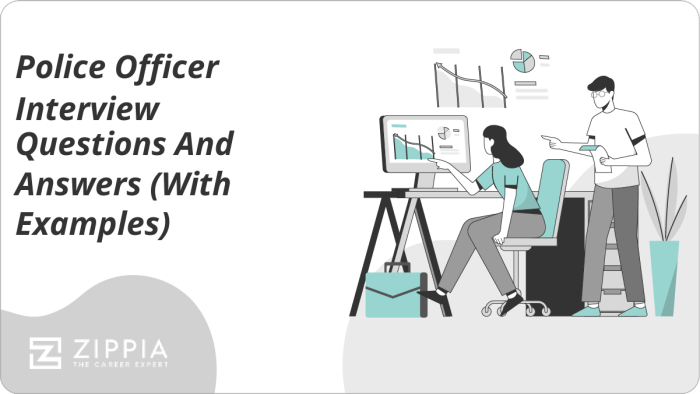Navigating the intricacies of police sergeant oral board scenario questions and answers is a crucial step in the journey towards career advancement. This guide provides an in-depth analysis of these questions, offering insights into their purpose, structure, and the key qualities they assess.
By understanding the dynamics of scenario questions, candidates can effectively prepare and demonstrate their situational judgment, leadership, decision-making abilities, and ethical reasoning.
Delving into the nuances of situational judgment, the guide explores its significance in police sergeant roles and how scenario questions evaluate candidates’ ability to make sound judgments under pressure. It also provides practical strategies for preparing for these questions, including resource recommendations and guidance on organizing and structuring responses.
1. Understanding Police Sergeant Oral Board Scenario Questions and Answers

Police sergeant oral board scenario questions are designed to assess candidates’ abilities to apply their knowledge and skills in realistic situations. These questions typically present a hypothetical scenario and ask the candidate to respond as if they were in that situation.
Scenario questions have a specific structure:
- Introduction:Sets the scene and provides relevant information.
- Situation:Describes the hypothetical scenario.
- Question:Asks the candidate to respond to the scenario.
Common scenario questions include:
- Responding to a domestic violence call
- Dealing with a suspect who is resisting arrest
- Managing a large-scale event
Objectives of scenario questions include:
- Assessing problem-solving skills
- Evaluating decision-making abilities
- Gauging leadership qualities
Tips for effectively answering scenario questions:
- Listen carefully to the scenario.
- Identify the key issues.
- Develop a clear and concise response.
- Support your response with evidence.
- Be confident and articulate.
2. Analyzing the Role of Situational Judgment in Scenario Questions

Situational judgment is the ability to assess a situation and make appropriate decisions. It is a critical skill for police sergeants, who are often required to make split-second decisions in high-pressure situations.
Scenario questions assess candidates’ situational judgment skills by presenting them with hypothetical situations and asking them how they would respond. These questions can be difficult to answer, as they require candidates to draw on their knowledge, experience, and values.
Examples of scenario questions that focus on situational judgment include:
- You are responding to a call about a domestic disturbance. When you arrive, you see a man and a woman arguing. The man is visibly intoxicated. What do you do?
- You are supervising a team of officers who are executing a search warrant. One of the officers finds a large amount of drugs. What do you do?
- You are working at a large-scale event when a group of people starts to riot. What do you do?
3. Preparing for Police Sergeant Oral Board Scenario Questions

Preparing for police sergeant oral board scenario questions is essential for success. There are several strategies that candidates can use to prepare:
- Review common scenario questions:Familiarize yourself with the types of questions that you are likely to be asked.
- Practice answering questions:The more you practice, the more confident you will become.
- Get feedback from others:Ask friends, family members, or colleagues to give you feedback on your responses.
- Use resources:There are a number of resources available to help you prepare for scenario questions, such as books, online courses, and mock interviews.
When organizing and structuring your responses, it is important to:
- Be clear and concise:Your responses should be easy to understand and follow.
- Use evidence to support your claims:Provide specific examples from your experience or training to support your answers.
- Be confident and articulate:Deliver your responses with confidence and clarity.
4. Communicating Effectively During Scenario Questions

Clear and concise communication is essential for success in police sergeant oral board scenario questions. Candidates should be able to articulate their thoughts and ideas in a way that is both clear and persuasive.
Techniques for presenting a persuasive and professional demeanor include:
- Maintain eye contact:This shows that you are engaged and interested in the conversation.
- Speak clearly and confidently:Project your voice and enunciate your words.
- Use body language to your advantage:Stand up straight and make appropriate gestures.
Non-verbal cues can also play a role in scenario questions. For example, maintaining eye contact shows that you are engaged and interested in the conversation. Nodding your head shows that you are listening and understanding what the other person is saying.
Smiling can help to create a rapport with the interviewer.
Helpful Answers
What is the purpose of police sergeant oral board scenario questions?
Scenario questions assess candidates’ situational judgment, leadership, decision-making abilities, and ethical reasoning, providing insights into their suitability for the role.
How can I effectively prepare for scenario questions?
Practice answering questions, seek feedback, and familiarize yourself with common scenarios and ethical dilemmas faced by police sergeants.
What are some key leadership and decision-making qualities sought in police sergeant candidates?
Effective communication, problem-solving abilities, empathy, and the capacity to make sound judgments under pressure are highly valued.